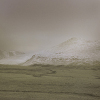 Nobody that has been following Richard Skelton's career thus far will be astonished to learn that he has added yet another new guise to his stable of projects (A Broken Consort, Carousell, etc.), but the actual content of Wolf Notes is a bit of a dramatic departure.  For one, it is a collaboration (with his wife, Autumn Richardson) rather than a solo endeavor.  Secondly, it is fairly vocal-centric, which caught me a bit off-guard.  In fact, it took me several listens to fully warm to it, as some of my favorite Skelton-esque qualities are downplayed.  In time, however, I grew to appreciate *AR as a uniquely  innocent and anachronistic entity all its own.
Nobody that has been following Richard Skelton's career thus far will be astonished to learn that he has added yet another new guise to his stable of projects (A Broken Consort, Carousell, etc.), but the actual content of Wolf Notes is a bit of a dramatic departure.  For one, it is a collaboration (with his wife, Autumn Richardson) rather than a solo endeavor.  Secondly, it is fairly vocal-centric, which caught me a bit off-guard.  In fact, it took me several listens to fully warm to it, as some of my favorite Skelton-esque qualities are downplayed.  In time, however, I grew to appreciate *AR as a uniquely  innocent and anachronistic entity all its own.
Wolf Notes is paradoxically an album that is both otherwordly and singularly natural, drawing its inspiration from the landscape surrounding the small Cumbrian village of Ulpha.  While "Ulpha" is descended from Norse words meaning "the hill frequented by wolves" (explaining the album's title), there is nothing sinister or feral happening here, though there is a feeling of primal timelessness that seems thematically appropriate:  Wolf Notes simply sounds like it was conceived and recorded in a world that is temporally and geographically very far from the one most of us inhabit.  That fits quite comfortably with Skelton's previous work: despite being deeply emotive and "human," it seems to be invariably inspired by places where there aren't many people around and that look pretty much exactly the same as they did a thousand years ago.
The five songs function as movements within a single work, as the same themes recur and evolve as the album progresses.  One lilting wordless melody in particular (sung by Autumn) serves as the album's central motif,  but it doesn't appear in every single song (though it is frequently hinted at or deftly danced around).  As for the underlying music, Skelton stays quite firmly within his area of expertise, weaving a groaning and shimmering multilayered web of treated violin drones.  I have always loved his playing and he is characteristically brilliant here, creating a vibrant and prickly halo of microtones and string buzz all around his slow-motion chamber melancholia. Incidentally, a "wolf note" is a type of dissonance, giving the album title a dual meaning.  I have no idea whether or not Skelton consciously uses them here though (obviously, it would be an egregious and unforgiveable thematic faux pas if he didn't).
The heightened sustain, reverb, and spectral after-images enhancing Richard's bowed strings are *AR's only conspicuous nods to modern recording, as Richardson's voice stays fairly pure and unmanipulated throughout.  Also, Skelton generally uses the studio to make himself sound "hyper-natural" rather than less natural.  That difference is important.  Similarly, there is also a conspicuous devotion to old-fashioned virtues like patience, clarity, and simplicity here, as the entire album unfolds at an unhurried pace that accumulates power and momentum simply through inventive repetition, variation, and thoughtfully constructed harmonies.
I think I still prefer some of Skelton's darker and grittier solo work to *AR, but this is definitely an inspired and elegant new facet to his oeuvre.  Actually, in some ways, Wolf Notes might be the most radical thing that he has done yet: there is an uncynical embrace of purity, place, nature, and raw beauty here that is squarely in opposition to our post-modern, post-everything culture (the Sustain-Release version of this album comes with a chapbook of poems about Urpha that even includes a list of native grasses).  He has touched upon all those things before, certainly, but the addition of Autumn's bittersweet voice makes it all seem a bit more vulnerable and human.  Maybe being defiantly pastoral will be the new punk.
Samples:
Read More

